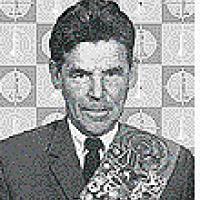
The Man Who Out Taled Tal
When we think of daring, attacking, sacrificial masters of the attack. Several names always come to mind. Andersson, Morphy, Blackburne, Marshall and, perhaps first and foremost, Mikhail Tal. But there is another name that deserves to be listed among this pantheon of Chess giants. It is a name many of us have never herd (And perhaps never will hear. It is quite a tongue-twister.) It is Rashid Gibiatovich Nezhmetdinov.
He was born in Aktubins USSR, now Kazakhstan. After being orphaned he moved to Kazan, still in the USSR, where he learned chess by watching others play, and had a great affinity for the game. He also had a great talent for checkers, and placed sixth in the Russian checker championship less than a year after learning the game, but he gave it up for chess.
He was in the military in the Second World War, and in 1949, he not only won the Russian Chess championship, but he yet again participated in the Russian checkers Championship and placed 2nd, only participating after a contestant fell ill (He hadn't even played in 15 years!). He went on to win the Russian Chess championship another four times.
He only ever competed outside of the USSR once (There were tight restrictions on chess players movements back then) and he placed 2nd in Bucharest, and for this was granted the title of International Master. Sadly, He never became a grandmaster, though his five Russian championship and plus score in 20 games against World Champions bespoke great talent.
An explanation for his lack of universal success was offered by fellow master Yuri Averbakh who said, "if he had the attack, could kill anybody, including Tal. But my score against him was something like 8½–0½ because I did not give him any possibility for an active game. In such cases he would immediately start to spoil his position because he was looking for complications."
Not only was he Tal's trainer during his 1961 match with Botvinnik, but he managed to beat Tal, not once, not twice, but three times (With only one loss, where Tal followed Averbakh's advice and damped the possibilities of the position) and he did it playing the same intuitive, combinational style epitomized (Or so we thought) by Tal.
Here is one of his most famous games, watch, and you'll see the master of attack become a student.






